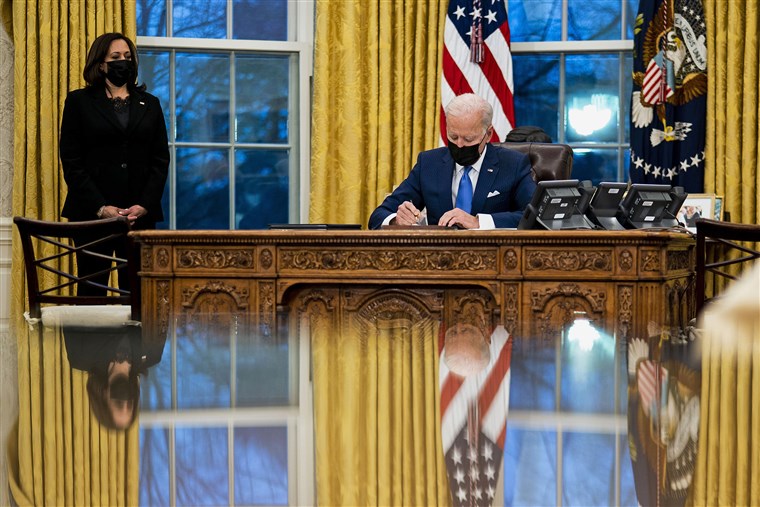A Week in Review: Biden’s First Days in Office
February 5, 2021
Joe Biden’s inauguration brought an administrative overhaul of the United States government. On his first day in office, Biden signed a series of executive orders, including a mandatory requirement of face masks on federal property, a temporary halt to student loan payments until September 30th, 2021, a nullification of all official documents enabling the existence of the Keystone XL pipeline, an order to include undocumented Americans in the official U.S. Census, an end to travel restrictions from 12 primarily Muslim countries, and a stop to the construction of the wall at the U.S.-Mexico border. Biden also began the process of rejoining the Paris Climate Agreement, which Donald Trump removed the U.S. from in June of 2017.
On Thursday, Biden began his first full day in office by mobilizing the Defense Production Act, which allows more government control over industries in times of crisis. The act also allows the federal government to create initiatives and government contracts in order to increase production of personal protective equipment (PPE) and ventilators. The administration has also placed a 60-day suspension on distributing permits for new oil drilling and oil and gas leasing.
Biden signed a moratorium set to begin blocking all deportations for 100 days, starting January 22nd; however, the moratorium was soon temporarily barred by a federal judge due to an agreement between the state of Texas and the Department of Homeland Security. The agreement requires that the government notify Texas officials 180 days before any changes to immigration policies.
Biden signed several executive orders on Friday, one of which advocated for food stamp benefits to increase by 15%, and has also proposed a 1.9 trillion dollar relief plan to Congress. But whether or not it will receive approval from the narrowly split House and Senate is uncertain. In any case, the new administration’s most pressing concern is the COVID-19 pandemic; however, nearly 70% of Americans approve of Biden’s plans to deal with the health crisis. Biden has criticized the distribution of vaccines, saying it has been, “a dismal failure so far.”
It was announced Saturday that President Biden and Prime Minister of Canada, Justin Trudeau, plan to meet next month in order to discuss collaboration between the two countries on a number of issues, including addressing climate change, as well as cooperating efforts to deal with the ongoing pandemic. On the same day, the Biden administration demanded Russia release protestors who were arrested for hosting a demonstration in retaliation for the country’s arrest of opposition leader Aleksey Navalny. A spokesperson for the administration, Ned Price, stated “We call on Russian authorities to release all those detained for exercising their universal rights and for the immediate and unconditional release of Aleksey Navalny.”
Biden attended his first mass as President at Georgetown’s Holy Trinity Catholic Church on Sunday, January 24th. Biden is the second Catholic president of the United States, as the first was John F. Kennedy, who also attended Holy Trinity, the oldest Catholic church in Washington D.C.
Biden issued an executive order repealing a ban which barred transgender individuals from serving in the U.S. military on Monday, January 25th. Biden also instated travel restrictions on Brazil, the UK, and South Africa in order to address potentially deadlier strains of the COVID-19 virus.
The Senate confirmed Anthony Blinken as Secretary of State under the Biden administration on Tuesday, January 26th, and Biden ended contracts between the federal government and private prisons. The administration also ordered 200 million doses of the COVID-19 vaccine to be distributed by August 31st.
The first weekly public briefing of the White House COVID-19 Response Team began a week after Biden’s inauguration, with Dr. Fauci making an appearance. Biden also spoke with Yoshihide Suga, Japan’s Prime Minister, and in their first press conference, White House National Climate Advisor Gina McCarthy and Special Climate Envoy John Kerry discussed climate policies of the new administration.


